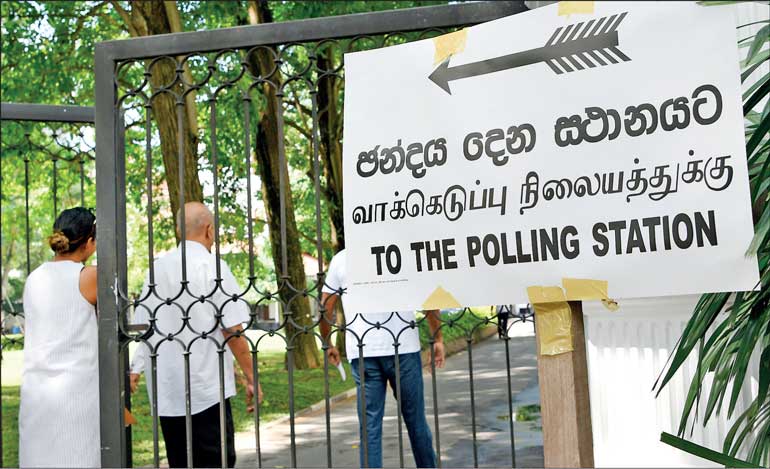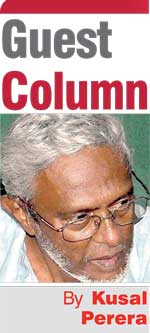Monday Feb 16, 2026
Monday Feb 16, 2026
Friday, 24 February 2023 00:15 - - {{hitsCtrl.values.hits}}

Mere casting of votes with absolutely no commitment for social development, and to elect representatives who do not know what their mandate is as elected members, does not lead to a “functional democracy” – Pic by Shehan Gunasekara
 Any tampering with or obstructing elections for people’s representations both technically and politically means, suppressing “democracy”. In Sri Lanka, and may be in most countries like Sri Lanka, how “democracy” is defined in terms of “elections” and how the two are socially endorsed, nevertheless is quite ambiguous.
Any tampering with or obstructing elections for people’s representations both technically and politically means, suppressing “democracy”. In Sri Lanka, and may be in most countries like Sri Lanka, how “democracy” is defined in terms of “elections” and how the two are socially endorsed, nevertheless is quite ambiguous.
BASL issued a very terse statement on 18 February (2023) based on the assumption that attempts to delay LG elections scheduled for 9 March is an attempt by the ruling government to suppress democracy. They said it is an “… unprecedented attack on democracy and the rule of law and pose a great threat to the electoral process in the future.” Their statement concluded by saying, they are “of the view that all attempts to interfere with the electoral process must not only be defeated, but all those responsible for such interference must be dealt with in accordance with the law.”
Accepted. No arguments and no concerns on that except for one major inconsistency BASL brings out and also on how an election becomes “democratic” with an ignorant, socially irresponsible constituency. How consistent may I ask is this stand on “elections and democracy” in relation to Provincial Councils (PC)? Some were dissolved in 2018 and all PCs were automatically dissolved constitutionally in 2019 at the end of their tenure, with no elections held for almost four years for now. BASL at no time said it is “an unprecedented attack on democracy” to deny PC elections.
PC elections were postponed indefinitely by the Elections Commission (EC) on the wholly invalid explanation that they have no option but to wait for the Yahapalana government to legislate a new law for PCs on the basis of the Delimitation Commission Report of 2018 that itself was being dragged for months. This writer openly challenged the EC Chairman Deshapriya on the grounds, mere drafting of new laws in parliament does not nullify existing laws, and the existing law remains in force until some day a new law or an amendment replaces it. This is what the Interpretations Ordinance No. 21 of 1901 amended through Act No. 29 of 1974 clearly says. Thus, constitutionally and in law, the EC was bound to hold PC elections without any excuses under the PCs Elections Act. No. 02 of 1988.
Surprisingly no political party including the TNA leadership, no human rights campaigners, nor social activists demanded PC elections as a sovereign right of the People. Nor did the BASL oppose indefinite postponing of PC elections. Wish the BASL and others would explain how delaying LG elections could threaten democracy, when long delayed PC elections do not.
This duplicity proves it certainly is not “democracy” and sovereignty of the People they are agitated about. It is partisan racist politics in the Sinhala South that cries foul about delaying LG elections. In the subconscious of the Sinhala-Buddhist psyche PCs remain rejected, perceived as conceding to Tamil demands. For that reason alone, PCs are not seen as a “necessity” in the governing system by the Sinhala South. That perhaps is where the BASL is, with PC elections.
Those who reject PCs, nevertheless, accept LG bodies with a massive unbearable load of 8,600 plus members that in 2018 was about 4,500. Since elections in February 2018, taxpayers have paid over Rs. 8 billion as basic allowance to these 8,600 plus LG members. Apart from that LG representatives are also entitled to transport, telephone, stamp fee and sitting allowances for finance, health and education sub-committees. Taxpayers have paid out a total of Rs. 20.7 billion roughly to LG members’ sustenance during the past five years, with LG administration, rent, staff salaries and other expenses adding on thereafter. All that may total to more than Rs. 30 billion and that is no small money for the taxpayer.
Was there anything of worth in return for all that billions of Rupees? Do voters and the elected members know what their responsibilities are, in electing and holding office? This brings out the other issue of “elections and democracy”. Does voting corrupt and irresponsible representatives to non-functional assemblies by ignorant, primitive and feudal voters, make elections a “democratic process”?
Mere casting of votes with absolutely no commitment for social development, and to elect representatives who do not know what their mandate is as elected members, does not lead to a “functional democracy”. What the BASL and others talk of as “democracy” is only “procedural”. Law wants elections to be held and therefore they are held. That only provides authoritarian rulers a podium to pose as “democratic leaders”. A decade or more ago, Mahinda Rajapaksa boasted he is the only president to hold elections every year, when he was holding LG and PC elections one after another spread through 2008 to 2014. Did they in any way strengthen the democratic life of the People? Or did People vote to have an improved way of democratic life?
Close to a century for now, voter perceptions have not changed. People do not vote for democracy and for improved life. They vote for petty, personal reasons, often closeted in feudal and racial mindsets as noted here.
“The reverse is rather the case; for, as we have shown, the evils of communal representation have accentuated rather than diminished racial differences, and caste distinctions, always acute, have, with the passage of years, lost little of their emotional appeal. We fear that it would be cleavages of this kind which would most naturally form the framework of a party system, and we need hardly point out that formation of parties on racial or caste lines would be fatal to the best interests of the country. Thus, there is at present not only no immediate prospect of the appearance of a party system but a serious danger that in the formation of parties obligations of race or caste would be too insistent to be ignored.” (Report of the Donoughmore Commission – p/31)
This remains not only on record, but in social life as well. Political parties are definitely racist. They compromise with Buddhist monks, Sinhala trader communities and racist local leaders in establishing a dominant Sinhala-Buddhist ideology that defines everything from government policy within a “Unitary” State to social dialogue. How deep this racial thinking has seeped into State institutes is evident in how the EC itself contributes to ethno-religious promotion in mainstream politics.
At the last 2020 August parliamentary elections, of all political parties that contested as “recognised” parties, 12 parties openly carried ethno-religious labels; Tamil, Tamil Eelam, Muslim, Sinhala, Hela, being few. Most Tamil parties have submitted their Constitutions to the EC in Tamil. Few in English said they stand for “an inclusive, secular State and promotes equality among all religious and ethnic communities while safeguarding the rights of Tamil/Muslim people”.
In contrast, there are rabidly racist Sinhala-Buddhist political parties recognised by the EC. One Sinhala political party says their main objective is, “The State would be established on Buddhist principles and the society of Buddhist monks (Sasanaya) would be nurtured and safeguarded”. There was yet another that said its sole objective is, “winning elections with Sinhala nationalist politics, and establishing a government in the Sinhala Island, foisting a Constitution for the Sinhala Island and re-establishing the Sinhala nation State.” Recognising such racist political parties says a lot about the EC that is expected to be “independent”.
Political parties also patronise Buddhist and Hindu religious institutes that thrive with caste divisions even in this 21st Century. Caste has seeped into all crevices of social life since the Donoughmore Commission recorded their concerns over 92 years ago. Party organisers for electorates are decided on caste preferences. Colombo East and Moratuwa are two such electorates in Colombo district. Ambalangoda, Balapitiya, Matara, Harispattuwa, Rambukkana, Mulkirigala, Tangalle, are few other electorates with very conspicuous caste exclusivity. For all elections, nominations are decided with calculated space for caste votes.
While district electorates on proportional representation also having preference votes promotes caste representation with caste patches within a district coming together to elect “their own” from a mainstream party, 40 years of free market economy with its cronyism polluted elections further. In a heavily corrupt society, voters rallied round candidates for sand and liquor permits, for construction contracts, for employment and promotions. Urban professionals looked for positions in State Corporations, chairmanships and consultancies.
Professional associations, urban middle class and their campaigns believe this primitive and divisive feudal Constituency in an awfully corrupt political system ensures “democracy” through elections. How do LG elections, or any election for that matter, safeguard “democracy” in a corrupt society, divided into caste, race and religion?
It is beyond ignorance to believe these elections with selfish, scheming voters provide for democracy worth safeguarding. They have not over decades, and they will not unless the voting constituency is awakened and enlightened to understand their vote carries social responsibility. That elected representatives have a legal mandate pre-decided for all representative assemblies. Municipal, Urban and PS are mandated under 3 Elections Ordinance and Acts. PCs come under the PC Election Act and the parliament under 1978 Constitution and the Parliament Elections Act.
These elections are held and restricted as legal procedures to be functional democratic processes, conscious voter participation demanding responsibility for improving quality of social life is an uncompromising need. Thus, with no serious electioneering to raise awareness of the voter to demand improvement on quality of life, statements on elections for “democratic rights” are as hollow as the elections the “rights defenders” speak about.